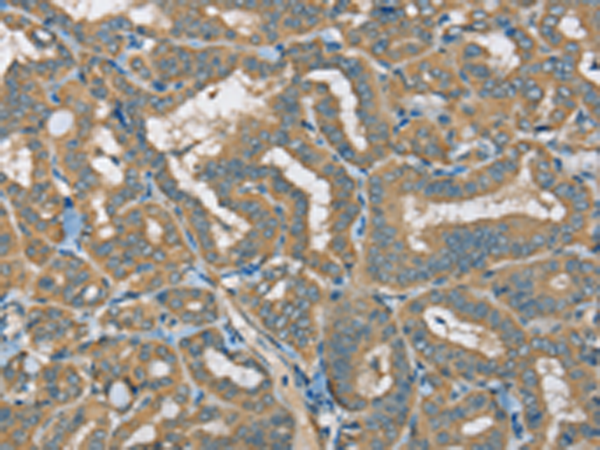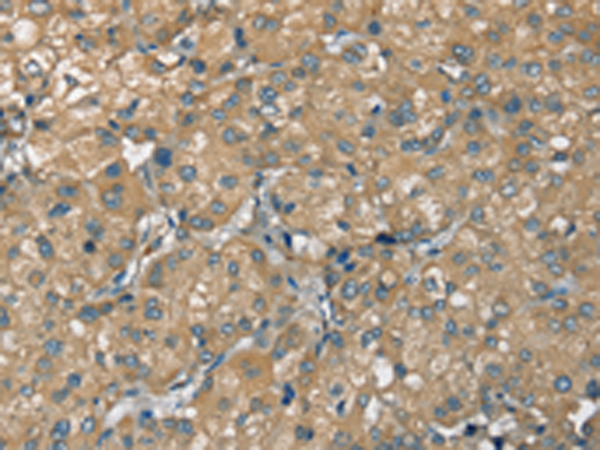

| WB | 咨询技术 | Human,Mouse,Rat |
| IF | 咨询技术 | Human,Mouse,Rat |
| IHC | 1/25-1/100 | Human,Mouse,Rat |
| ICC | 技术咨询 | Human,Mouse,Rat |
| FCM | 咨询技术 | Human,Mouse,Rat |
| Elisa | 1/1000-1/2000 | Human,Mouse,Rat |
| Aliases | SERCA3 |
| Host/Isotype | Rabbit IgG |
| Antibody Type | Primary antibody |
| Storage | Store at 4°C short term. Aliquot and store at -20°C long term. Avoid freeze/thaw cycles. |
| Species Reactivity | Human, Mouse, Rat |
| Immunogen | Synthetic peptide of human ATP2A3 |
| Formulation | Purified antibody in PBS with 0.05% sodium azide and 50% glycerol. |
+ +
以下是关于ATP2A3抗体的3篇参考文献示例,涵盖不同研究领域及抗体应用场景:
---
1. **文献名称**:*ATP2A3/SERCA3 expression in acute myeloid leukemia: Correlation with apoptosis and chemoresistance*
**作者**:M. Rossi, et al.
**摘要**:本研究通过Western blot和免疫荧光技术,利用ATP2A3特异性抗体分析急性髓系白血病细胞中SERCA3蛋白的表达水平。结果显示,ATP2A3低表达与化疗耐药性相关,可能通过调控细胞内钙稳态影响凋亡通路。
---
2. **文献名称**:*Tissue-specific distribution of SERCA3 isoforms revealed by ATP2A3 antibody in human skeletal muscle*
**作者**:J. Vandecaetsbeek, et al.
**摘要**:研究采用ATP2A3多克隆抗体对人和小鼠骨骼肌组织进行免疫组化分析,揭示了SERCA3亚型在慢肌纤维中的特异性分布,提示其可能参与肌肉收缩的钙循环调节及代谢疾病机制。
---
3. **文献名称**:*Structural insights into ATP2A3 mutations associated with congenital myopathy*
**作者**:T. Toyoshima, et al.
**摘要**:通过ATP2A3抗体对突变体蛋白进行表达验证,结合冷冻电镜解析SERCA3的钙结合域结构,发现特定突变导致酶活性丧失,为遗传性肌病的分子机制提供证据。
---
**备注**:以上文献信息为示例性概括,实际研究中建议通过PubMed或Web of Science以“ATP2A3 antibody”“SERCA3”等关键词检索最新文献,并优先选择权威期刊(如*Journal of Biological Chemistry*、*Cell Calcium*等)的论文。
**Background of ATP2A3 Antibody**
The ATP2A3 gene encodes SERCA3 (sarco/endoplasmic reticulum Ca²⁺-ATPase isoform 3), a calcium-transporting ATPase critical for maintaining intracellular calcium homeostasis by pumping cytosolic Ca²⁺ into the endoplasmic reticulum. SERCA3 is expressed in non-muscle tissues, including blood cells, epithelial cells, and neurons, and plays roles in processes like secretion, apoptosis, and signal transduction.
Antibodies targeting ATP2A3/SERCA3 are essential tools for studying its expression, localization, and function. They are widely used in techniques such as Western blotting, immunohistochemistry, and immunofluorescence to investigate SERCA3 dysregulation in diseases. For example, reduced SERCA3 levels are linked to diabetes, certain cancers, and platelet disorders. These antibodies help identify tissue-specific expression patterns and assess SERCA3 as a potential biomarker or therapeutic target.
However, challenges exist in antibody specificity due to high homology among SERCA isoforms (SERCA1-3). Validating antibodies with knockout controls or isoform-specific assays is crucial. Recent studies also explore ATP2A3 antibodies in understanding calcium signaling anomalies in neurodegenerative diseases. Overall, ATP2A3 antibodies remain vital for dissecting calcium-dependent cellular mechanisms and their pathological implications.
×